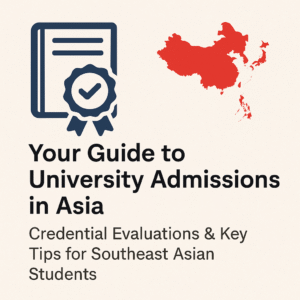
As international studies become more accessible and popular, students from Southeast Asia are increasingly pursuing education in destinations such as the U.S., U.K., Australia, Canada, and Europe. One key step in this process is the credential evaluation—a service that helps universities abroad understand how your academic history aligns with their educational standards.
But is it always necessary? In this blog post, we break down when and why students from Southeast Asia might need a credential evaluation when applying to universities overseas. We’ve also included regional data, agency information, and online education trends.
What Is a Credential Evaluation?
A credential evaluation is an assessment that determines the equivalency of foreign academic documents compared to the education system of the host country. These evaluations typically include:
- Verification of authenticity
- Degree comparability (e.g., is your bachelor’s degree equivalent to a U.S. bachelor’s?)
- Course-by-course or document-by-document breakdown
- Grading scale comparison
Credential evaluations help ensure fairness and clarity during the admissions process, particularly when evaluating international applicants from diverse educational systems.
Do You Need a Credential Evaluation?
Whether or not you need a credential evaluation depends on:
- Destination Country Requirements
- Level of Study (Undergraduate or Graduate)
- The University’s Own Policies
Let’s take a look at some major destination countries.
By Destination: Evaluation Requirements for Southeast Asian Students
| Destination Country | Credential Evaluation Required? | Common Agencies Used | Notes for SEA Students |
| United States | Yes (often required) | WES, ECE, ACEI | Required for most undergrad and graduate programs. Schools may specify the type of evaluation—over 29,000 SEA students in the U.S. (2023). |
| United Kingdom | Sometimes | UK ENIC, In-house | Internal reviews are common. UK ENIC is used for unfamiliar credentials—over 16,000 Malaysians study in the UK. |
| Australia | Sometimes | In-house | Universities refer to the Department of Education’s guidelines, with over 75,000 SEA students in Australia. |
| Canada | Yes (often) | WES Canada, IQAS | Required for graduate admissions. Over 12,000 SEA students received study permits in 2019. |
| Germany | Yes | Anabin, ZAB | APS is required for some SEA countries, such as Vietnam. |
| Japan | Sometimes | In-house | Verification of GPA and transcripts required. Japan hosts over 20,000 SEA students. |
| South Korea | Sometimes | In-house | Translations and notarization are often required. Korea is rising in popularity among SEA applicants. |
| Malaysia | Rarely | In-house | Local recognition is common due to regional familiarity. |
| Singapore | Rarely | In-house | Direct evaluations and national exam results are widely accepted as reliable indicators. |
Undergraduate vs. Graduate
- Undergraduate Applicants:
- High school diplomas or national exam results may be sufficient if well-known (e.g., SPM, STPM, UAN, or Thai M.6)
- Some countries or schools may request additional verification for lesser-known credentials
- Graduate Applicants:
- Bachelor’s degrees must align with the academic level in the host country
- Course-by-course evaluations are often needed for credit recognition or entry eligibility
Processing Times for Major Agencies
| Agency | Standard Processing | Rush Options |
| WES | ~7 business days | No rush service |
| UK ENIC | 15 working days | 48 hours (Fast Track) |
| ACEI | 5-7 business days | 1-3 business days |
Delays may occur if documentation is incomplete. Plan 2– 3 months in advance of deadlines.
Online and Hybrid Programs
Southeast Asian students show high interest in online and hybrid education. According to a 2022 survey:
- 44.5% prefer hybrid formats (highest globally)
- 8.2% prioritize online delivery when choosing programs
Credential Evaluation Tip: As long as the awarding institution is accredited, most evaluators will accept online degrees as valid for evaluation.
Tips for Southeast Asian Students
- Check Your Target School: University websites typically mention whether credential evaluation is required and which agencies they accept.
- Use Recognized Agencies: When needed, select agencies like ACEI, ENIC-NARICs, WES, and any other recognized service provider that institutions trust.
- Translate & Certify: Non-English documents should be translated by a certified professional and, if necessary, notarized.
- Prepare Early: Evaluations can take 2–6 weeks to complete. Start the process once you’ve finalized your university shortlist.
- Check for APS (if applying to Germany): Vietnamese and Indonesian applicants may require APS verification, a specialized process that involves interviews and documentation.
Final Thoughts
Credential evaluations are often necessary for students from Southeast Asia pursuing international education. From over 350,000 SEA students studying abroad to evolving hybrid programs, understanding documentation and agency requirements can ease your path.
If you’re unsure whether you need a credential evaluation or which type to choose, ACEI is here to help. Start your evaluation process today and make your international education journey a smooth one.
